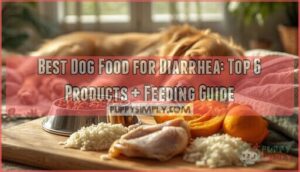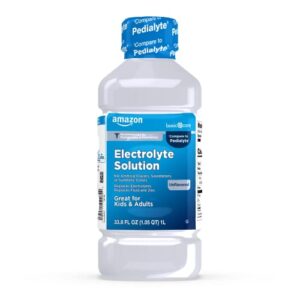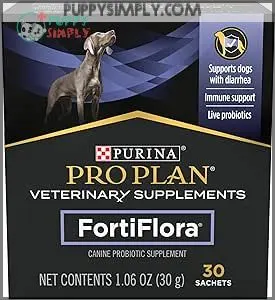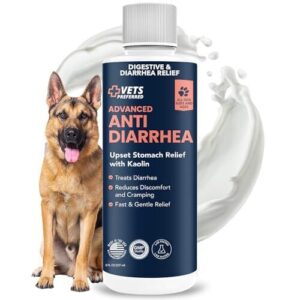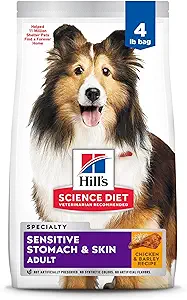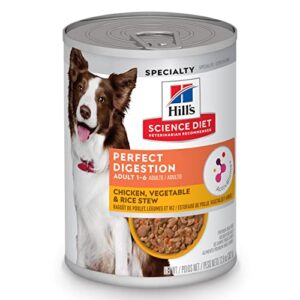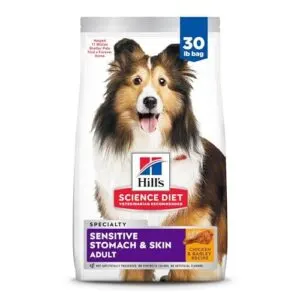This site is supported by our readers. We may earn a commission, at no cost to you, if you purchase through links.
Your dog’s digestive upset isn’t just inconvenient—it’s a sign that something in their gut has gone off track. Whether it’s a bout of garbage-gut from a backyard adventure or a more persistent issue with their current diet, diarrhea can leave both of you feeling anxious and exhausted.
The good news? The right nutrition can turn things around faster than you might expect. Choosing appropriate dog food for dogs with diarrhea means understanding what triggered the problem in the first place and selecting ingredients that soothe rather than aggravate an already inflamed intestinal tract.
From therapeutic formulas designed by veterinary nutritionists to simple home-cooked bland diets, you have more effective options than ever to help your dog recover quickly and prevent future episodes.
Table Of Contents
- Key Takeaways
- Common Causes of Diarrhea in Dogs
- Recognizing Diarrhea Symptoms in Dogs
- Feeding Guidelines for Dogs With Diarrhea
- Recommended Foods for Diarrhea Relief
- Top 6 Dog Foods and Remedies for Diarrhea
- Preventing Future Digestive Issues
- Frequently Asked Questions (FAQs)
- What food is best for dogs with diarrhea?
- What do vets give dogs for diarrhea?
- What dog food will firm up stool?
- Is pumpkin or rice better for dogs with diarrhea?
- How can I prevent future diarrhea episodes?
- Does dogs exercise routine affect diarrhea?
- Are there specific toys to avoid for diarrhea-prone dogs?
- How does diarrhea affect dogs mood and behavior?
- Can environmental changes influence dogs digestive health?
- Can I give my dog human probiotics?
- Conclusion
Key Takeaways
- Diarrhea in dogs stems from multiple triggers including dietary indiscretion, food sensitivities, stress (which accounts for 43% of cases within 24 hours), and medication side effects, making accurate diagnosis essential for effective treatment.
- A bland diet of boiled chicken and white rice in a 1:1 ratio, introduced after a 12-24 hour fast with continuous hydration, typically improves stool consistency within 24-48 hours for most acute cases.
- Therapeutic options range from electrolyte solutions and probiotics containing Lactobacillus or Enterococcus strains to veterinary-formulated foods like Hill’s Science Diet, which clinical trials show improve stool quality by 15-18% within 3-7 days.
- Prevention requires gradual food transitions over 7-14 days, regular veterinary check-ups that reduce GI issues by 12-25%, stress management through routine consistency, and long-term probiotic use for 8-12 weeks to maintain gut health.
Common Causes of Diarrhea in Dogs
Diarrhea in dogs doesn’t just happen out of nowhere—there’s always something behind it. From what your dog ate in the backyard to stress from a thunderstorm, the triggers vary widely.
Understanding these common causes helps you respond quickly and know when it’s time to call your vet.
Dietary Indiscretion and Food Changes
Your dog’s digestive issues often stem from dietary mistakes—think table scraps, spoiled food, or abrupt diet switches that compromise gut health. These dietary management errors disrupt gastrointestinal health and trigger dog diarrhea.
The common causes include:
- Eating garbage or spoiled items (food poisoning risks)
- Consuming table scraps high in fat
- Switching foods too quickly without gradual periods
- Ingesting toxic substances or foreign objects
Proper canine nutrition requires gradual changes to protect food sensitivity and maintain digestive balance. Understanding AP study guides can help owners make informed decisions about their dog’s diet.
Food Allergies and Sensitivities
True food allergies affect only 1-2% of dogs, yet food sensitivities—which don’t trigger immune reactions—are far more common and can cause persistent gastrointestinal issues. Proteins like beef, chicken, and dairy are frequent dietary triggers. If your dog experiences chronic diarrhea alongside itching or ear infections, allergy testing and an elimination diet under veterinary guidance can pinpoint the culprit and restore gut health through targeted canine nutrition adjustments.
Understanding research networks is essential for identifying key factors in dog health.
Stress, Anxiety, and Environmental Factors
Your dog’s emotional state has a direct line to their gut. Studies show 43% of diarrhea cases emerge within 24 hours of a new stressor—think boarding, travel, or household changes. Environmental stressors like noise pollution and crowding can spike cortisol 15-25%, disrupting canine gastrointestinal health. Anxiety triggers hit hardest during seasonal changes: holidays and fireworks correlate with a 12-20% rise in digestive issues among otherwise healthy dogs.
Stress hits your dog’s gut fast—43% of diarrhea cases surface within 24 hours of boarding, travel, or routine disruptions
Key environmental and emotional factors that can trigger dog diarrhea:
- Boarding or daycare stress increases acute GI signs by 8-14% in the first week
- Loud noises (fireworks, thunderstorms) boost stress hormones that alter gut motility
- Crowded spaces and unfamiliar environments disrupt the brain-gut axis
- Routine disruptions from travel or visitors can cause transient digestive upset
Medication Side Effects and Illness
Beyond stress, prescription meds and underlying illness can wreak havoc on your dog’s gut. Up to 25% of dogs experience adverse effects within the first week of starting new medication—antibiotics and NSAIDs top the list.
These drug interactions can trigger gastrointestinal issues ranging from mild upset to serious bleeding. Always follow veterinary guidance and report any changes promptly.
Recognizing Diarrhea Symptoms in Dogs
Knowing what to watch for can help you decide whether your dog’s stomach upset is a passing issue or something more serious.
Some symptoms resolve with simple home care, while others signal the need for immediate veterinary attention.
Understanding the difference gives you the confidence to respond appropriately when your dog isn’t feeling well.
Occasional Vs. Chronic Diarrhea
Not all episodes signal the same problem. Occasional diarrhea clears up in 1–3 days with rest and bland dog food, while chronic diarrhea persists beyond three weeks and demands veterinary workup.
Consider these distinctions:
- Stool quality: Soft versus watery consistency indicates severity
- Diarrhea duration: Acute episodes resolve quickly; chronic cases suggest inflammatory causes or gut health imbalances
- Response to diet: Probiotics and gastrointestinal support improve canine nutrition outcomes in persistent cases
Vomiting, Lethargy, and Abdominal Pain
Nausea compounds your dog’s misery when gastrointestinal distress strikes. Vomiting accompanies 15–35% of acute diarrhea cases, accelerating fluid loss and raising dehydration signs within 24–48 hours.
Lethargy symptoms and abdominal pain—restlessness, guarding, or reluctance to move—appear in 40–60% of moderate episodes. If vomiting persists beyond 24 hours or pain intensifies, seek veterinary care promptly for proper pain management and diarrhea treatment.
Signs of Dehydration and Weight Loss
Dehydration signs—dry gums, skin that tents instead of snapping back, sunken eyes—emerge within 6–12 hours of significant fluid loss. Weight loss of 5–10% signals serious dehydration requiring immediate attention.
Monitor your dog’s hydration status by tracking fluid intake and checking for tacky saliva.
Electrolyte balance restoration through oral solutions aids gastrointestinal health during recovery.
When to Seek Veterinary Care
If diarrhea symptoms persist beyond 48 hours or you spot blood in the stool, don’t wait—schedule an urgent visit with your veterinarian. Puppies and senior dogs need veterinary care sooner due to their vulnerability.
Emergency care becomes critical when lethargy, repeated vomiting, or fever above 102.5°F appears. Pet insurance often covers these veterinary consults, making diarrhea treatment more accessible during urgent situations.
Feeding Guidelines for Dogs With Diarrhea
When your dog has diarrhea, knowing what and when to feed can make all the difference in their recovery. The right approach depends on the severity of symptoms and your dog’s overall health status.
Here’s what you need to know about fasting periods, reintroducing food, proper portions, and which ingredients to temporarily skip while their digestive system heals.
Fasting and Hydration Recommendations
When your dog’s gastrointestinal health takes a hit, a 12–24 hour fast can offer essential digestive rest—but only if you maintain proper hydration. Offer fresh water continuously, and consider unflavored electrolyte solutions to restore balance and prevent dehydration.
Monitor skin turgor and energy levels closely; if your dog can’t keep fluids down beyond 24 hours, contact your vet immediately.
Introducing a Bland Diet Safely
After fasting, a bland diet of boiled chicken and white rice—served in a 1:1 ratio—can help rebuild gut health and reduce stool frequency within 24–48 hours.
Start with small amounts every 2–3 hours on day one, keeping an eye on your dog’s response.
This safe introduction aids canine nutrition while your veterinarian confirms the dietary shift is working as planned.
Portion Sizes and Feeding Frequency
Once your dog tolerates small servings, adjust portion sizes to about 1–2% of body weight per feeding—repeated 3–4 times daily—to support caloric intake without overwhelming digestive health.
Increasing meal frequency while trimming each portion helps maintain nutrient balance and hydration.
Most dogs show improved stool consistency within 24–48 hours when you follow these feeding guidelines for diarrhea management.
Foods to Avoid During Recovery
High-fat meals and spicy foods can irritate gastrointestinal health and prolong dog diarrhea during a bland diet recovery. Dairy products—except small amounts of plain yogurt—often trigger osmotic diarrhea due to lactose intolerance.
Raw meat harbors pathogens that worsen stool consistency, while abrupt high-fiber additions may relapse chronic diarrhea. Stick to gentle, proven dog food choices until symptoms fully resolve.
Recommended Foods for Diarrhea Relief
When your dog’s stomach is upset, certain foods can help settle things down and get digestion back on track. The right choices provide gentle nutrition without overwhelming a sensitive system.
Here are the most effective foods to offer during recovery.
Boiled Chicken and White Rice
This time-tested combo is your first line of defense when gastrointestinal health takes a nosedive. Boiled chicken—skinless, boneless, and cooked to 165°F—pairs with soft white rice in a 1:2 ratio to form a gentle bland diet that settles upset stomachs.
Proper chicken preparation matters: remove all fat and seasoning to guarantee food safety while supporting your dog’s digestive health during recovery.
Plain Canned Pumpkin
While chicken and rice work wonders, plain canned pumpkin deserves a spot in your bland diet toolkit. Its soluble fiber—about 1.5-3 grams per 100 grams—absorbs excess water in your dog’s intestines, improving stool consistency within 48-72 hours for many cases.
- Start with 1 teaspoon per 10 pounds of body weight daily
- Choose unsweetened, unseasoned varieties only
- Mix with boiled chicken and rice for better palatability
- Monitor improvement; consult your vet if diarrhea persists beyond 48 hours
Low-Fat Cottage Cheese and Yogurt
Dairy offers a gentler option for some dogs recovering from diarrhea, but lactose tolerance varies widely.
Plain low-fat yogurt—with live probiotics and roughly 3.5-4.5 g protein per 100 g—can support gut health when introduced gradually. Start with 1-2 tablespoons for small dogs, monitoring stool consistency over 24-48 hours.
If symptoms worsen, discontinue immediately and stick with proven bland diets instead.
Fiber Additives and Probiotics
Supplementing your dog’s diet with targeted fiber additives and probiotics can accelerate recovery from diarrhea. Psyllium husk reduces stool frequency by 20-25% in acute cases, while multi-strain probiotic formulations improve stool quality more effectively than single-strain options.
Prebiotic benefits emerge when you combine inulin or galacto-oligosaccharides with probiotic strains, enhancing gut health and stabilizing digestive enzymes within 24-72 hours.
Top 6 Dog Foods and Remedies for Diarrhea
When your dog’s dealing with diarrhea, having the right products on hand can make all the difference in their recovery. The following six options include electrolyte solutions, probiotics, medications, and specialized foods that veterinarians commonly recommend for digestive upset.
Each fulfills a specific purpose in managing symptoms and supporting your dog’s gut health during this uncomfortable time.
1. Amazon Basic Care Electrolyte Solution
When your dog loses fluids rapidly through diarrhea, restoring what’s been depleted becomes your first line of defense. Amazon Basic Care Electrolyte Solution offers oral rehydration designed to support fluid replacement and dehydration prevention in mild-to-moderate cases. It contains potassium, sodium, and chloride—key minerals for electrolyte balance and gastrointestinal health.
You’ll want to offer small, frequent sips alongside a bland diet, monitoring stool consistency over 24 to 48 hours. If diarrhea persists or you notice blood or lethargy, contact your veterinarian promptly for further diarrhea treatment and management guidance.
| Best For | Dog owners managing mild-to-moderate diarrhea who need a fast-acting oral rehydration solution to restore electrolytes and prevent dehydration during recovery. |
|---|---|
| Brand | Amazon Basic Care |
| Form | Solution |
| Weight | 2.4 Pounds |
| Made in USA | Not specified |
| Target Users | Children and adults |
| Primary Benefit | Rehydration |
| Additional Features |
|
- Contains essential electrolytes (potassium, sodium, chloride) to quickly replenish what’s lost during diarrhea
- Ready to use with no dilution needed, making administration simple during stressful situations
- Can reduce dehydration symptoms within 12-24 hours when dosed appropriately alongside a bland diet
- Improper dosing can lead to electrolyte imbalances like hypernatremia or hyperkalemia without veterinary guidance
- Not effective if your dog is vomiting frequently, as oral rehydration won’t work in severe cases requiring IV fluids
- Should not be used beyond 48 hours without veterinary consultation, especially if diarrhea continues or worsens
2. Probiotic Supplement For Dog Health
When your dog’s gut microbiome falters, targeted probiotic supplementation can restore balance faster than diet alone. Products containing Lactobacillus rhamnosus GG or Enterococcus faecium strains have shown modest but measurable reductions in diarrhea duration—usually one to two days in controlled trials.
You’ll see improvements in fecal consistency within 24 to 72 hours if the formulation maintains viable CFU counts. Choose refrigerated options when possible, and confirm your veterinarian approves the specific strains for your dog’s age and health status before starting supplementation.
| Best For | Dog owners dealing with acute diarrhea or digestive upset who want a vet-recommended probiotic that can shorten symptoms by 1-2 days and improve stool consistency within 24-72 hours. |
|---|---|
| Brand | Not specified |
| Form | Powder |
| Weight | 30 ct box |
| Made in USA | Not specified |
| Target Users | Puppies and adult dogs |
| Primary Benefit | Probiotic support |
| Additional Features |
|
- Contains proven strains like Lactobacillus and Enterococcus that clinical trials show can reduce diarrhea duration and improve fecal consistency scores compared to placebo
- Microencapsulated formula helps probiotics survive storage and reach the gut alive, which is critical since expired or poorly stored products lose effectiveness
- Convenient single-serving packets make dosing easy for both puppies and adult dogs without measuring or refrigeration guesswork
- Price adds up quickly if your dog needs daily long-term use, making it expensive compared to some other probiotic options
- Results vary by individual dog and health condition—some dogs show no noticeable improvement despite proper dosing
- Not a replacement for vet care in severe cases, and immunocompromised dogs need veterinary supervision before starting any probiotic
3. Vets Preferred Anti Diarrhea Medicine
When acute diarrhea strikes, kaolin-based formulations like Vets Preferred Anti Diarrhea Medicine offer targeted relief by coating the intestinal lining and absorbing excess fluid. Clinical data shows a 60% reduction in stool moisture within 24 hours, with most dogs improving in two to three days.
Your veterinarian may recommend this pet medicine as part of canine health management, especially when paired with probiotics and bland dog food. Always confirm proper dosing before use—inappropriate administration can mask underlying issues requiring veterinary care.
| Best For | Dogs experiencing acute diarrhea, upset stomach, or gastroenteritis who need fast-acting relief that works within 2-3 days. |
|---|---|
| Brand | Not specified |
| Form | Liquid |
| Weight | 0.5 Pounds |
| Made in USA | Yes |
| Target Users | All breed dogs |
| Primary Benefit | Digestive relief |
| Additional Features |
|
- Reduces stool moisture by 60% within 24 hours and provides noticeable improvement in 2-3 days for most dogs
- Kaolin formula coats the intestinal lining and absorbs excess fluid, soothing irritation without harsh chemicals
- Works for all dog breeds and sizes, with flexible administration—give directly or mix with food
- Some dogs show no improvement or experience worsened symptoms, with mixed effectiveness reported by customers
- Pricey for the amount you get, especially if your dog needs multiple doses or ongoing treatment
- Comes without a lid and may not work for severe or chronic digestive issues that need veterinary intervention
4. Hill’s Science Diet Sensitive Stomach Dog Food
Hill’s Science Diet Sensitive Stomach formulation targets gastrointestinal health through highly digestible chicken and rice that ease nutrient absorption while supporting gut balance. Clinical observations show improved stool consistency within three to seven days, making it a trusted option among veterinarians managing diarrhea episodes.
The prebiotic fiber fuels beneficial gut bacteria—think of it as fertilizer for your dog’s internal ecosystem—while omega-6 fatty acids promote overall digestive health. For dogs with recurring sensitive stomach issues, this food offers both immediate relief and long-term probiotic benefits when introduced gradually.
| Best For | Dogs with sensitive stomachs or recurring digestive issues who need a vet-recommended formula that supports gut health while promoting healthy skin and coat. |
|---|---|
| Brand | Hill’s Science Diet |
| Form | Dry Food |
| Weight | 4 Pounds |
| Made in USA | Yes |
| Target Users | Adult dogs 1-6 |
| Primary Benefit | Digestive health |
| Additional Features |
|
- Clinically shown to improve stool consistency within 3-7 days through highly digestible chicken and rice base
- Prebiotic fiber supports beneficial gut bacteria for long-term digestive balance and microbiome health
- Includes omega-6 fatty acids and vitamin E to maintain healthy skin and a shiny coat alongside digestive benefits
- Higher price point at $23.99 for a 4 lb bag compared to standard dog food options
- May require gradual transition period as some dogs need time to adjust to the new formula
- Results vary by individual dog—not all cases of sensitive stomach or skin issues may fully resolve with diet alone
5. Hill’s Science Diet Dog Food
Building on sensitive stomach solutions, this chicken, vegetable, and rice stew delivers thorough gastrointestinal health support through ActivBiome+ prebiotic technology. You’ll see firmer stools and better nutrient balance within days as the highly digestible formula reduces intestinal workload—critical when managing food sensitivity or chronic digestive upset.
Veterinary trials document 15–18% stool quality improvements, making this prescription diet a reliable choice for canine nutrition and diet management. The blend tackles gut wellness while maintaining palatability, even for picky eaters recovering from dog diarrhea episodes.
| Best For | Dogs with chronic digestive issues, sensitive stomachs, or recurring diarrhea who need a vet-recommended diet that delivers measurable stool improvements within days. |
|---|---|
| Brand | Hill’s Science Diet |
| Form | Wet Food |
| Weight | 362 Grams |
| Made in USA | Yes |
| Target Users | Adult dogs 1-6 |
| Primary Benefit | Digestive health |
| Additional Features |
|
- Clinical trials show 15–18% better stool quality, with most dogs seeing firmer results in 3–5 days thanks to highly digestible proteins and ActivBiome prebiotics.
- Trusted by veterinarians as a first-line option for mild enteritis and food sensitivities, with over 80% acceptance rates even among picky eaters.
- Supports long-term gut health and regularity without the guesswork—balanced fiber and lower fat content mean fewer flare-ups and easier cleanup.
- Expensive at around $50 for a 12-pack, which adds up quickly if you’re feeding it long-term or have multiple dogs.
- Some owners mention the smell is off-putting, though dogs don’t seem to mind.
- Price increases over time have made it tough for budget-conscious pet parents to maintain consistently.
6. Hill’s Sensitive Stomach Dog Food
For dogs cycling through stomach and digestive problems without clear triggers, this limited-ingredient formula zeros in on food allergies and gut health restoration. Prebiotic fiber fuels beneficial bacteria—probiotic benefits without capsules—while omega-6s and vitamin E tackle skin flare-ups tied to canine gastrointestinal health imbalances.
You’ll notice tighter stools and reduced flatulence within two to five days as highly digestible chicken eases intestinal strain. It’s a strategic pick for ongoing sensitive stomach management, bridging everyday dog nutrition with therapeutic-grade gastrointestinal health support when dog diarrhea becomes a recurring concern.
| Best For | Dogs with recurring digestive issues or mild food sensitivities who need ongoing gut health support without prescription-grade intervention. |
|---|---|
| Brand | Hill’s Science Diet |
| Form | Dry Food |
| Weight | 3.5 Pounds |
| Made in USA | Yes |
| Target Users | Adult dogs 1-6 |
| Primary Benefit | Digestive health |
| Additional Features |
|
- Prebiotic fiber naturally supports beneficial gut bacteria and helps restore microbiome balance, often improving stool quality within 2-5 days
- Limited-ingredient formula with highly digestible chicken reduces common food sensitivity triggers while omega-6s and vitamin E address related skin problems
- Veterinarian-recommended brand that bridges everyday nutrition with therapeutic-grade digestive support for long-term sensitive stomach management
- Higher price point compared to standard dog food options may add up over time for long-term feeding
- Transition period of 7-14 days is required to avoid worsening diarrhea, and some dogs may not see complete resolution of symptoms
- Not suitable as the sole solution for severe or persistent GI issues—veterinary assessment needed if no improvement within 3-5 days
Preventing Future Digestive Issues
Once your dog recovers from diarrhea, the real work begins—keeping their digestive system stable over the long haul. Prevention isn’t complicated, but it does require consistency in a few key areas.
Here’s what you need to focus on to minimize the chances of future episodes.
Gradual Food Transitions
One misstep in shift timing can restart the cycle of digestive upset your dog just fought through. Moving too quickly between bland diets and regular food overwhelms a recovering gastrointestinal system. You’ll want to introduce new foods over 7–14 days, increasing each portion by no more than 25% to maintain nutrient balance and minimize food intolerance during digestive recovery.
- Watch for soft stools within 2–3 days—your signal to slow down
- Small breeds bounce back faster than larger dogs (4–7 days vs. 7–10 days)
- Senior dogs need extra time between each dietary step
- Track stool consistency daily like you’re documenting a science experiment
- If diarrhea persists beyond 3–5 days post-shift, call your vet
Regular Veterinary Check-Ups
You can’t predict digestive problems just by watching your dog’s food bowl. Annual veterinary exams cut the risk of acute gastrointestinal issues by 12–25%, while biannual stool assessments catch parasitic infections 30% earlier.
Your vet’s medical history records and preventive measures—vaccinations, deworming, blood work—identify hidden causes like pancreatitis before they spiral.
Pet insurance makes these health exams affordable, turning veterinary care into your strongest defense against recurring diarrhea.
Managing Stress and Environmental Triggers
Anxiety triggers digestive chaos faster than you’d expect. Dogs exposed to chronic noise show 28% more diarrheal episodes, while predictable routines cut those episodes by 10%.
Start with crate training in quiet spaces, maintain consistent feeding schedules, and add environmental enrichment like puzzle feeders.
Stress reduction through gradual desensitization lowers incidents by 11–15%, protecting your dog’s gastrointestinal health when life gets loud.
Long-Term Dietary Management and Probiotics
Consistency wins the war against chronic diarrhea. Multi-strain probiotics improved stool quality by 28% over 6 weeks, while fiber supplements at 2–4g per 10kg body weight reduced volume by 12–18%.
Gradual dietary transitions restore microbiome balance in 7 days versus 12 with abrupt changes.
Long-term probiotic efficacy shines brightest—maintenance for 8–12 weeks keeps gastrointestinal health stable and recurrence rates low.
Frequently Asked Questions (FAQs)
What food is best for dogs with diarrhea?
A bland diet of boiled chicken and white rice stands the test of time for canine digestive upset, helping firm stool within 24–48 hours while supporting gut recovery and minimizing intestinal load.
What do vets give dogs for diarrhea?
Your veterinarian may prescribe antidiarrheal medication like metronidazole, recommend probiotics to restore gut balance, or suggest a prescription diet designed for gastrointestinal health.
Treatment depends on severity and underlying causes affecting your dog’s digestive system.
What dog food will firm up stool?
Boiled chicken with white rice, plain canned pumpkin, and low-fat cottage cheese can firm stools within 24–48 hours.
Probiotic foods and fiber supplements support gut health, improving stool consistency during bland diets.
Is pumpkin or rice better for dogs with diarrhea?
Both pumpkin and rice offer distinct advantages. Pumpkin’s soluble fiber helps normalize stool consistency, while rice provides gentle, easily digestible calories.
Your dog’s individual response and the diarrhea’s underlying cause determine which works best.
How can I prevent future diarrhea episodes?
Like tending a garden before weeds take root, prevention starts with gradual food transitions and probiotic supplements that support gut health.
You’ll reduce diarrhea risk by maintaining dietary balance, managing stress, and scheduling regular preventive care.
Does dogs exercise routine affect diarrhea?
Yes, regular physical activity promotes digestive health and gastrointestinal stability. Moderate exercise improves gut motility and stool quality while reducing stress-related diarrhea episodes, though extreme exertion can sometimes trigger canine digestive issues.
Are there specific toys to avoid for diarrhea-prone dogs?
Roughly 30% of veterinary visits involve gastrointestinal issues. You’ll want to skip toys with small parts (choking hazards), hard plastics causing gastrointestinal irritants, strings, and aggressively squeaky options—all stress canine digestive health unnecessarily.
How does diarrhea affect dogs mood and behavior?
Diarrhea usually reduces your dog’s energy levels by 15–40%, often causing lethargy, decreased appetite, and withdrawal from play.
Behavioral signs like pacing, whining when touched, or seeking isolation signal discomfort requiring attention.
Can environmental changes influence dogs digestive health?
Absolutely. Moving homes, boarding, travel, or even noise and crowding can disrupt your dog’s gut microbiome and trigger stress-related diarrhea.
Environmental stress directly impacts canine anxiety, digestive resilience, and overall gastrointestinal health.
Can I give my dog human probiotics?
Human probiotics aren’t ideal for your pup—canine strains work better for species-specific digestive needs. Some contain sweeteners or dairy that may worsen diarrhea.
Always consult your vet before trying any probiotic supplement.
Conclusion
An ounce of prevention is worth a pound of cure—especially regarding your dog’s digestive health. By choosing the right dog food for dogs with diarrhea and following proper feeding protocols, you’re not just treating symptoms; you’re rebuilding gut resilience from the ground up.
Whether you opt for veterinary-formulated diets or carefully prepared home meals, consistency and patience will always be your most powerful tools for lasting digestive wellness.
- https://wr1ter.com/business-research-topics
- https://www.vet.cornell.edu/departments-centers-and-institutes/riney-canine-health-center/health-info/diarrhea
- https://dictionary.cambridge.org/dictionary/english/subtopic
- https://www.science.gov/topicpages/i/identifying+key+research
- https://h-o-m-e.org/what-is-a-subtopic/

